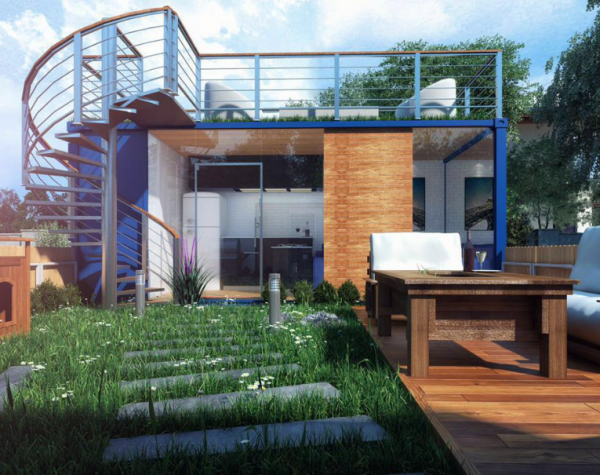
By: Rania Khalil
@RaniaYehia
In a world plagued with pollution and environmental decay, Egyptian entrepreneurs Karim Rafla and Youssef Farag are recycling abandoned shipping containers to build houses and restaurants.
The young entrepreneurs are using container architecture, also known as ‘cargotecture’, to put Egypt back on the track to sustainable development.
They strive to accomplish this by reducing pollution and constructing buildings at lower costs.
“We aim to provide products that are not only more affordable, but are also higher in quality and sustainable,” Farag, co-founder and an AUC finance alumnus, told The Caravan.
“This method will increase people’s opportunities through homes, starting small businesses and education as well,” he added.
Cargotecture is a method of architecture that started in Europe and was recently introduced to Egypt.
Qubix is the first and only company that solely relies on such a method for architectural sustainable development.
“The building process begins by preparing these containers before using them in building,” Rafla, a Regents University of London alumnus, told The Caravan.
“We develop the containers internally using heat and insulation and finally plumbing them,” he added.
Shipping containers are commonly used in this practice because they are affordable and mobile.
“Shipping containers serve as the perfect building block that you can easily develop to whatever you want. They can be opened with each other or even stacked just like Lego,” said Farag.
The initiative also has various benefits to the economy that can help the Egyptian government provide more job opportunities for the youth.
“[In such projects] you’re not using a huge budget like most businesses, which consequently paves the way for young entrepreneurs to start their business,” said Ashraf Sheta, adjunct faculty at the department of management.
“This way we can solve the ongoing problem of unemployment,” he added.
The idea of the project first came to Rafla, who has since then been quite ecstatic to introduce it to the Egyptian community.
“When I came back from London, where I first heard of the cargotecture concept, I asked myself ‘why don’t we have this in Egypt?’ As soon as I came back to Egypt, I proposed this idea to my best friend Youssef who was also just as impressed,” he added.
The concept of recycling and reusing containers is not a new one – it was first introduced in the United States in 1987.
However, there have been very few recycling projects in the Arab World, especially in Egypt.
Rafla and Farag began working on their prototype in March 2016 and had their first order by August.
Within six months, they delivered a fully functional home in Beni Suef and a BeFit facility in Maadi. They are currently working on constructing a restaurant.
“Expenses vary from project to project, the reason is that every product we do is specifically tailored to our clients’ needs. But of course expenses are cheaper than regular building ones,” Rafla added.
Although the government has recently declared a sustainable development plan that will be completed by 2030, the entrepreneurs did not receive any governmental support.
“Egypt declared their 2030 vision for a better environment through using the sustainable development concept. This means that projects like the containers one should be supported,” said Sheta.
Projects that heavily rely on recycling and other sustainable development methods face numerous difficulties in Egypt.
“We see this a lot, [someone] in the street with a car made of recycled material or containers and selling sandwiches and suddenly his business closes. That’s because the government always gives them a really hard time,” said Sheta.
“The Egyptian government needs to go easy on those businesses and simplify the laws a bit,” he added.